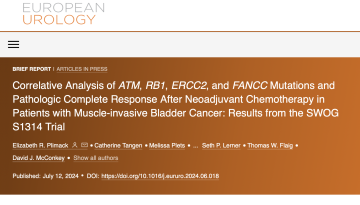A Small Subset of SWOG’s Recent Achievements
Like any good steward of public resources, the NCI asks those it funds to deliver regular progress reports. Earlier this fall, SWOG and the other groups received a request asking for a list of key accomplishments "started or realized during the current grant period," which began in March of 2019.
Assembling this list was a real opportunity to take stock of what we’ve achieved. You have previously asked for this column to keep you posted about scientific achievements, so here is a subset of our accomplishments over the last few years.
Top trial results and publications or presentations
The NCTN asked for top trial results and top publications or presentations separately, but as the two typically travel together, I offer them together here.
- Our S1609 DART basket trial in rare cancers has enrolled 793 patients across 53 rare cancer cohorts. As the national study for rare cancers and immunotherapy, numerous major publications have come from DART, such as its findings in patients with nonpancreatic neuroendocrine tumors, published in Clinical Cancer Research in May of 2020. That was one of the journal’s most oft-cited articles.
- The S1007 RxPONDER trial continues to produce headlines (including at this month’s San Antonio Breast Cancer Symposium). Primary results, published in the New England Journal of Medicine, established a new standard of care for postmenopausal women with HR-positive, HER2-negative breast cancer with one to three positive nodes and a 21-gene recurrence score of 25 or less. RxPONDER showed that adjuvant chemotherapy provides no benefit to these women, and they do just as well on adjuvant endocrine therapy alone.
- The S1800A Lung-MAP sub-study was the first trial in which a non-chemotherapy combination showed an overall survival benefit in patients with advanced non-small cell lung cancer who had a history of immunotherapy. The US Food and Drug Administration recently awarded breakthrough designation to the pembrolizumab–ramucirumab combination used in this trial. Results were presented at the 2022 ASCO annual meeting and simultaneously published in the Journal of Clinical Oncology.
- The S1500 PAPMET multi-arm study in metastatic papillary renal cell carcinoma compared three MET kinase inhibitors to the then standard of care, identifying cabozantinib as the clear winner. Results were published in The Lancet, and yet another standard of care changed.
- Earlier this year, the results of our S1801 trial were presented to much fanfare in a Presidential Symposium at the European Society for Medical Oncology (ESMO) 2022 Congress. S1801 showed that starting pembrolizumab treatment before surgery rather than after surgery significantly lengthened event-free survival in patients with stage III-IV high-risk melanoma.
Top collaborations
- The Lung-MAP umbrella trial has to be near the top of any list of successful NCTN collaborations, encompassing a range of partners outside of the NCI that include Friends of Cancer Research, the Foundation for the NIH, Foundation Medicine, and numerous industry colleagues.
- SWOG has also hosted the pan-NCTN MyeloMATCH committee and will soon activate the first trial in the MyeloMATCH portfolio of studies in myeloid malignancies. MyeloMATCH features the first universal, cross-group patient identifiers used in any NCTN trial, laying the groundwork for future collaborations we previously could only dream about.
- Over the past two years, SWOG and the Children’s Oncology Group (COG) have held quarterly calls to explore systemic similarities and differences between our groups and to share best practices. This is the type of collaboration that puts the “cooperative” in “cooperative groups.”
- Some of our most successful collaborations cross national borders.
- SWOG has international collaborations with cancer centers in South Korea, Saudi Arabia, and six countries in Latin America: Mexico, Perú, Colombia, Chile, Uruguay, and Brazil.
- Our SWOG Latin America Initiative organizes regular symposiums at SWOG group meetings, holds virtual training conferences for early- to mid-career Latin American researchers, hosts educational conferences in Latin America, and recently launched a biannual SLAI newsletter.
- SWOG is contributing to a new regional study to characterize the expression of immune checkpoints in gastric cancer in Latin American countries.
- SWOG has international collaborations with cancer centers in South Korea, Saudi Arabia, and six countries in Latin America: Mexico, Perú, Colombia, Chile, Uruguay, and Brazil.
Key efforts to enhance diversity in group leadership and patient enrollment
I’ve detailed these efforts in previous Front Lines, so I provide them in shorthand here, with appropriate links.
- Appointed a new vice chair for diversity, equity, inclusion, and professional integrity
- Named five DEI champions with minority recruitment expertise to work with select committees
- Convened a DEI monitoring committee to regularly review trial diversity
- Brought in a DEI consulting firm to perform a baseline assessment
- Developed a mandatory DEI teaching tool for SWOG leaders (TeamScience@SWOG Module 6)
- Brought perspectives of historically underrepresented communities into SWOG with the addition of community advocates to our patient advocate committee
- Established a VA committee to bring NCI trials to a wider group of VA medical centers
Top translational studies using non-integral NCTN trial samples
- Our S1403 study found that circulating tumor DNA (ctDNA) kinetics can predict progression-free and overall survival in EGFR TKI-treated patients with EGFR-mutant non-small cell lung cancer.
- Our joint CALGB/SWOG 80405 study showed that tumor immunogenomic features determine outcomes in patients with metastatic colorectal cancer treated with standard-of-care combinations of bevacizumab and cetuximab.
- An analysis of pre- and post-treatment tissues from the S0800 trial revealed an effect of neoadjuvant chemotherapy on the breast cancer genome. The results suggest that genomic disturbances in BRCA-related DNA-repair mechanisms increase sensitivity to chemotherapy.
- A study identified genomic aberrations associated with early progression, progression-free survival, and overall survival in a large set of pretreatment samples from patients enrolled to the SWOG S0016 trial in follicular lymphoma.
- Researchers identified the DNA-damage immune response signature and stromal tumor-infiltrating lymphocytes as predictive of improved disease-free and overall survival for patients on the S9313 trial who had triple-negative breast cancer treated with adjuvant chemotherapy.
Top special or unique operational initiatives
- Our protocol resourcing task force last year developed a web-accessible dashboard and several strategies and tools to better track and allocate operations and statistical support across SWOG committees.
- In response to requests from our sites, SWOG developed a clearinghouse of curated training materials designed to alleviate some of the staff training burden that is exacerbated by rapid turnover.
- We identified COVID-driven changes to standard operating procedures for our protocols and suggested updated protocol language that will allow our sites increased flexibility with these procedures in the future.
Whew! That’s just a tiny fraction of what our investigators and members did recently. But it’s enough to convey the scope and import of what we’ve accomplished over the last few years. I hope you agree it’s plenty to be proud of!
Other Recent Stories



